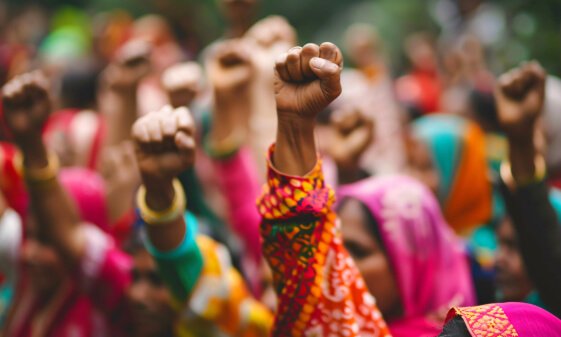July 9 Bharat Bandh: Is Discontent Reaching Boiling Point?
Unions and Farmers Unite in Planned Strike Involving 250 Million Workers
July 8, 2025
A joint forum of 10 central trade unions has called for a nationwide general strike, or “Bharat Bandh,” on July 9 in protest against what it calls the central government’s “anti-worker, anti-farmer, and anti-national pro-corporate policies.” With over 250 million (25 crore) workers expected to join from several critical sectors, the strike could be one of the most significant confrontations between the government and the country’s organised and unorganised workforce in recent years.
The strike is expected to see participation from workers cutting across sectors such as banking, insurance, postal services, coal mining, state transport and various parts of the formal and informal economies. The Samyukta Kisan Morcha and several agricultural workers’ unions have extended their support, announcing large-scale mobilisations in rural areas, according to Hindustan Times.
The unions say this mass action follows months of preparation across the country and builds on similar strikes observed in 2020, 2022 and 2023, according to The Indian Express. They have presented a 17-point charter of demands, which they claim the government has ignored.
Grievances
The unions’ key grievances include the government’s refusal to hold the annual labour conference for a decade and its push to enforce four new labour codes, which they say are meant to dismantle worker protections. They argue these codes would raise working hours, weaken rights to strike and collective bargaining, dilute labour law enforcement, and stifle union activity. Theyn see it as part of a strategy to favour corporate interests under the guise of “ease of doing business.”
They also criticise the government’s economic policies, blaming them for rising joblessness, stagnant wages, inflation and shrinking public spending on health, education and welfare, all of which they say are worsening inequality and deepening hardship for poor and middle-income groups.
The unions further allege a democratic decline, accusing the government of misusing constitutional bodies to silence dissent and criminalise protest. They have cited attempts to disenfranchise migrant workers in Bihar and refer to proposed laws in Maharashtra, Chhattisgarh and Madhya Pradesh as efforts to suppress mass movements.
The Seriousness of the Concerns
The grievance that the government hasn’t held the Indian Labour Conference in 10 years is a serious problem. It may suggest a breakdown in “tripartite consultation,” a system in democracies where workers, employers and the government are expected to jointly discuss and decide on labour policies. It’s meant to ensure that all sides have a voice in shaping laws that affect jobs, wages and working conditions. The impression that this process has been sidelined makes the government’s labour reforms appear one-sided and biased in favour of employers.
The unions’ accusation that the government is misusing constitutional bodies and trying to disenfranchise migrant workers may point to what political theorists refer to as democratic backsliding. It’s a situation where democratic institutions like election commissions, courts or labour boards exist on paper, but their independence and fairness are slowly undermined. Power becomes more concentrated in the hands of the government, and public accountability is weakened. So even though the system looks democratic from the outside, the actual checks and balances that protect people’s rights and ensure fair governance begin to break down.
From a political economy perspective, the unions see this shift as a sign that the government is moving away from the idea of a welfare state, where the state takes responsibility for ensuring a minimum standard of living for all citizens, especially by supporting workers, the poor and vulnerable through laws, public services and redistributive policies. Instead, they argue, the government is behaving more like a supporter of big business, shaping laws and policies to benefit corporate interests.
Economically, the unions’ concerns reflect several deep-rooted structural problems. Contrary to government claims, they point to rising job losses, wages that fail to keep pace with living costs, inflation in essential goods and declining public spending on services like health and education.
India has seen economic growth for many years, but it hasn’t created enough stable, formal jobs. Most people still work in informal jobs that don’t offer job security, health benefits or legal protections. About 90% of India’s workforce is in informal employment, where many workers have little control over their pay or working conditions. The government’s move to privatise public services and replace permanent jobs with contract or gig work is making things worse. It reduces steady incomes for families and makes it harder for them to plan or spend confidently, which in turn affects the overall economy.
The planned strike also reflects the friction between capital accumulation and inclusive growth. Neoliberal economic policies since the 1990s have focused on deregulation and attracting investment, often at the expense of labour protections.
The farmers’ and rural workers’ support for the strike adds another layer. It indicates that discontent is not limited to urban labour but also exists in agrarian India. This suggests that the problems are cutting across sectors and geographies.
Politically, when workers, farmers and informal labourers come together, it reflects a serious build-up of discontent with the government’s policies. Continued refusal to engage with labour and agrarian demands has, in many past instances around the world, turned economic grievances into organised political resistance.
You have just read a News Briefing by Newsreel Asia, written to cut through the noise and present a single story for the day that matters to you. Certain briefings, based on media reports, seek to keep readers informed about events across India, others offer a perspective rooted in humanitarian concerns and some provide our own exclusive reporting. We encourage you to read the News Briefing each day. Our objective is to help you become not just an informed citizen, but an engaged and responsible one.

